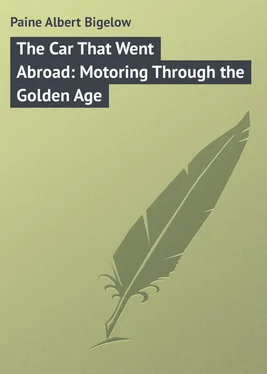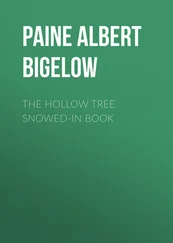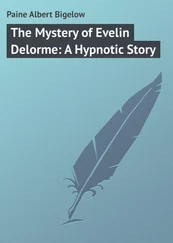Albert Paine - The Car That Went Abroad - Motoring Through the Golden Age
Здесь есть возможность читать онлайн «Albert Paine - The Car That Went Abroad - Motoring Through the Golden Age» — ознакомительный отрывок электронной книги совершенно бесплатно, а после прочтения отрывка купить полную версию. В некоторых случаях можно слушать аудио, скачать через торрент в формате fb2 и присутствует краткое содержание. Жанр: foreign_prose, Путешествия и география, на английском языке. Описание произведения, (предисловие) а так же отзывы посетителей доступны на портале библиотеки ЛибКат.
- Название:The Car That Went Abroad: Motoring Through the Golden Age
- Автор:
- Жанр:
- Год:неизвестен
- ISBN:нет данных
- Рейтинг книги:5 / 5. Голосов: 1
-
Избранное:Добавить в избранное
- Отзывы:
-
Ваша оценка:
- 100
- 1
- 2
- 3
- 4
- 5
The Car That Went Abroad: Motoring Through the Golden Age: краткое содержание, описание и аннотация
Предлагаем к чтению аннотацию, описание, краткое содержание или предисловие (зависит от того, что написал сам автор книги «The Car That Went Abroad: Motoring Through the Golden Age»). Если вы не нашли необходимую информацию о книге — напишите в комментариях, мы постараемся отыскать её.
The Car That Went Abroad: Motoring Through the Golden Age — читать онлайн ознакомительный отрывок
Ниже представлен текст книги, разбитый по страницам. Система сохранения места последней прочитанной страницы, позволяет с удобством читать онлайн бесплатно книгу «The Car That Went Abroad: Motoring Through the Golden Age», без необходимости каждый раз заново искать на чём Вы остановились. Поставьте закладку, и сможете в любой момент перейти на страницу, на которой закончили чтение.
Интервал:
Закладка:
But Narcissa said that the rhyme was bad, and I gave it up. Besides, I remembered that Thackeray had written a poem on the same subject.
One must go early to get a seat at Pascal's. There are rooms and rooms, and waiters hurrying about, and you must give your order, or point at the bill of fare, without much delay. Sea food is the thing, and it comes hot and delicious, and at the end you can have melon – from paradise, I suppose, for it is pure nectar – a kind of liquid cantaloupe such as I have seen nowhere else in this world. 2 2 Our honey-dew melon is a mild approach to it.
You have wine if you want it, at a franc a bottle, and when you are through you have spent about half a dollar for everything and feel that life is a song and the future made of peace. There came moments after we found Pascal's when, like the lotus eaters, we felt moved to say: "We will roam no more. This at last is the port where dreams come true."
Our motor clearance required a full ten days, but we did not regret the time. We made some further trips by tram, and one by water – to Château d'If, on the little ferry that runs every hour or so to that historic island fortress. To many persons Château d'If is a semi-mythical island prison from which, in Dumas' novel, Edmond Dantes escapes to become the Count of Monte Cristo, with fabulous wealth and an avenging sword. But it is real enough; a prison fortress which crowns a barren rock, twenty minutes from the harbor entrance, in plain view from the Corniche road. François I laid its corner stone in 1524 and construction continued during the next seventy years. It is a place of grim, stubby towers, with an inner court opening to the cells – two ranges of them, one above the other. The furniture of the court is a stone stairway and a well.
Château d'If is about as solid and enduring as the rock it stands on, and it is not the kind of place one would expect to go away from alive, if he were invited there for permanent residence. There appears to be no record of any escapes except that of Edmond Dantes, which is in a novel. When prisoners left that island it was by consent of the authorities. I am not saying that Dumas invented his story. In fact, I insist on believing it. I am only saying that it was a remarkable exception to the general habit of the guests in Château d'If. Of course it happened, for we saw cell B where Dantes was confined, a rayless place; also cell A adjoining, where the Abbé Faria was, and even the hole between, through which the Abbé counseled Dantes and confided the secret of the treasure that would make Dantes the master of the world. All of the cells have tablets at their entrances bearing the names of their most notable occupants, and that of Edmond Dantes is prominently displayed. It was good enough evidence for us.
Those cells are on the lower level, and are merely black, damp holes, without windows, and with no floors except the unleveled surface of the rock. Prisoners were expected to die there and they generally did it with little delay. One Bernadot, a rich Marseilles merchant, starved himself, and so found release at the end of the twelfth day; but another, a sailor named Jean Paul, survived in that horrible darkness for thirty-one years. His crime was striking his commander. Many of the offenses were even more trifling; the mere utterance of a word offensive to some one in power was enough to secure lodging in Château d'If. It was even dangerous to have a pretty daughter or wife that a person of influence coveted. Château d'If had an open door for husbands and fathers not inclined to be reasonable in such matters.
The second-story prisons are larger and lighter, but hardly less interesting. In No. 5 Count Mirabeau lodged for nearly a year, by suggestion of his father, who did not approve of his son's wild ways and thought Château d'If would tame him. But Mirabeau put in his time writing an essay on despotism and planning revolution. Later, one of the neighboring apartments, No. 7, a large one, became the seat of the tribunal révolutionnaire which condemned there sixty-six to the guillotine.
Many notables were sent to Château d'If on the charge of disloyalty to the sovereign. In one of the larger cells two brothers were imprisoned for having shared the exile of one Chevalier Glendèves who was obliged to flee from France because he refused to go down on his knees to Louis XIV. Royalty itself has enjoyed the hospitality of Château d'If. Louis Philippe of Orléans occupied the same large apartment later, which is really quite a grand one for a prison, with a fireplace and space to move about. Another commodious room on this floor was for a time the home of the mysterious Man of the Iron Mask.
These are but a few – one can only touch on the more interesting names. "Dead after ten years of captivity "; "Dead after sixteen years of captivity"; such memoranda close many of the records. Some of the prisoners were released at last, racked with disease and enfeebled in mind. Some went forth to the block, perhaps willingly enough. It is not a place in which one wishes to linger. You walk a little way into the blackest of the dungeons, stumbling over the rocks of the damp, unleveled floor, and hurry out. You hesitate a moment in the larger, lighter cells and try to picture a king there, and the Iron Mask; you try to imagine the weird figure of Mirabeau raging and writing, and then, a step away, the grim tribunal sorting from the nobility of France material for the guillotine. It is the kind of thing you cannot make seem real. You can see a picture, but it is always away somewhere – never quite there, in the very place.
Outside it was sunny, the sea blue, the cliffs high and sharp, with water always breaking and foaming at their feet. The Joy insisted on being shown the exact place where Dantes was flung over, but I was afraid to try to find it. I was afraid that there would be no place where he could be flung into the water without hitting the sharp rocks below, and that would end the story before he got the treasure. I said it was probably on the other side of the island, and besides it was getting late. We sailed home in the evening light, this time into the ancient harbor, and landed about where Lucian used to land, I should think, such a long time ago.
It was our last night in Marseilles. We had been there a full ten days, altogether, and time had not hung upon our hands. We would still have lingered, but there was no longer an excuse. Even the car could not furnish one. Released from its prison, refreshed with a few liters of gasoline — essence , they call it – and awakened with a gentle hitch or two of the crank, it began its sweet old murmur, just as if it had not been across some thousands of miles of tossing water. Then, the clutch released, it slipped noiselessly out of the docks, through the narrow streets, to a garage, where it acquired its new numbers and a bath, and maybe a French lesson or two, so that to-morrow it might carry us farther into France.
Chapter III
ACROSS THE CRAU
There are at least two ways to leave Marseilles for the open plain of the Provence, and we had hardly started before I wished I had chosen the other one. We were climbing the rue de la République, or one of its connections, when we met, coming down on the wrong side of the tram line, one of the heaviest vehicles in France, loaded with iron castings. It was a fairly crowded street, too, and I hesitated a moment too long in deciding to switch to the wrong side, myself, and so sneak around the obstruction. In that moment the monstrous thing decided to cross to its own side of the road, which seemed to solve the problem. I brought the car to a standstill to wait.
But that was another mistake; I should have backed. The obstruction refused to cross the tram track. Evidently the rails were slippery and when the enormous wheels met the iron they slipped – slipped toward us – ponderously, slowly, as inevitable as doomsday. I was willing to back then, but when I shifted the lever I forgot something else and our engine stopped. There was not enough gravity to carry us back without it; neither was there room, or time, to crank. 3 3 The reader is reminded that this was in a day when few cars cranked otherwise than by hand.
So there we were, with that mountain closing in upon us like a wall of Poe's collapsing room.
Интервал:
Закладка:
Похожие книги на «The Car That Went Abroad: Motoring Through the Golden Age»
Представляем Вашему вниманию похожие книги на «The Car That Went Abroad: Motoring Through the Golden Age» списком для выбора. Мы отобрали схожую по названию и смыслу литературу в надежде предоставить читателям больше вариантов отыскать новые, интересные, ещё непрочитанные произведения.
Обсуждение, отзывы о книге «The Car That Went Abroad: Motoring Through the Golden Age» и просто собственные мнения читателей. Оставьте ваши комментарии, напишите, что Вы думаете о произведении, его смысле или главных героях. Укажите что конкретно понравилось, а что нет, и почему Вы так считаете.












